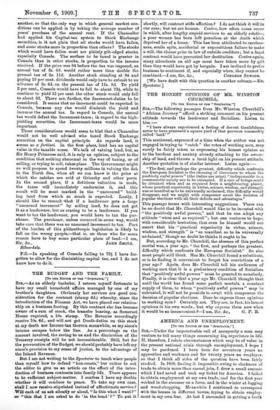THE HONEST OPINIONS OF MR. WINSTON CHURCHILL.
rTO THE EDITOR Or THE "SPECTATOR."] SIR,—The following passages from Mr. Winston Churchill's "African Journey" afford a striking comment on his present
attitude towards the landowner and Socialism. Listen to him :-
"I have always experienced a feeling of devout thankfulness never to have possessed a square yard of that perverse commodity
called "
This sentiment, expressed at a time when the author was not engaged in trying to " catch" the votes of working men, may surely be fairly taken as expressing his honest opinion as to the burdens and anxiety already attaching to the owner-
ship of land, and throws a lurid light on his present attitude. Another quotation is of similar interest. Listen again :—
" The first, and perhaps the greatest, difficulty which confronts the European Socialist is the choosing of Governors to whom the positively awful powers" (the italics are mine) "indispensable to a communistic society are to be entrusted. If a race of beings could be obtained when and as required from a neighbouring planet, whose practical superiority in virtue, science, wisdom, and strength was so manifest as to be universally acclaimed, this difficulty would disappear, and we might with composure await the decision of popular elections with all their defects and advantages."
This passage teems with interesting suggestions. There can be no doubt that Mr. Churchill would like to be invested with
"the positively awful powers," and that he can adopt any attitude "when and as required "; but one ventures to hope, with considerable hesitation, that even he himself would not assert that his "practical superiority in virtue, science, wisdom, and strength" is "so manifest as to be universally acclaimed," though no doubt he thinks it ought to be.
But, according to Mr. Churchill, the absence of this perfect mortal was, a year ago, "the first, and perhaps the greatest, difficulty which confronts the European Socialist." So also
most people still think. Has Mr. Churchill found a substitute, or is he finding it convenient to forget his convictions of a year ago ? Again, does Mr. Churchill tell his audiences of working men that it is a preliminary condition of Socialism that "positively awful powers" must be granted to somebody. Finally, it is clear that a year ago Mr. Churchill thought that until the world has found some perfect mortals, a constant supply of them, to whom "positively awful powers" may be entrusted, it will not be possible to await with composure the decision of popular elections. Does he express these opinions
to working men ? Certainly not. They are, in fact, his honest opinions in his own words ; but why express them now when
it would be so inconvenient P—I am, Sir, &c., G. P. B.






























































 Previous page
Previous page